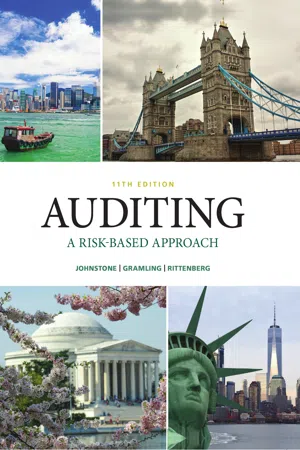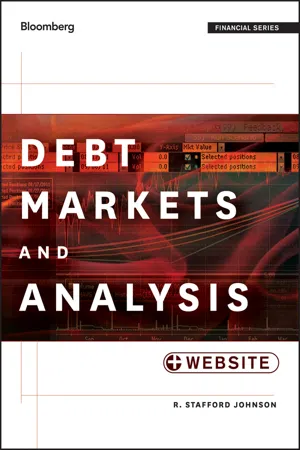Business
Marketable Securities
Marketable securities are financial instruments that can be easily bought or sold in the market, such as stocks, bonds, and money market instruments. They are considered liquid assets and are typically held by businesses as short-term investments to generate returns on excess cash. These securities provide flexibility and potential for capital appreciation while maintaining liquidity.
Written by Perlego with AI-assistance
Related key terms
1 of 5
5 Key excerpts on "Marketable Securities"
- eBook - PDF
- Janette Rutterford, Marcus Davison(Authors)
- 2017(Publication Date)
- Red Globe Press(Publisher)
We now turn to securities market products, to explore the different types of securities on offer to investors in securities markets, including shares, bonds and derivative prod-ucts. We then explore the risks of these products before describing the basics of stock markets, in particular the benefits of such markets and their classifications. The chapter then looks at the concept of market efficiency and the efficient market hypothesis before ending with a historical profile of the London stock market. SECURITIES MARKET PRODUCTS The main investment products traded in the stock market – shares and bonds – are finan-cial claims on the companies, governments and other organisations that issue them in order to raise funds for their medium and long-term financing needs. These claims become the assets of investors who buy them, and liabilities of, or claims on, the entities that issue them. They form just a part (though a very important part) of the broader universe of products used by the financial markets to channel funds from economic sectors in financial surplus ( surplus sectors ) to economic sectors in financial deficit ( deficit sectors ). It is important to appreciate where Marketable Securities fit into the wider financial markets, and how the financial markets as a whole fit into the real economy , where non-financial or real assets (goods and services) are produced and distributed. By contrast, a financial asset is one that consists solely of a claim on a future stream of cash. When governments, companies and other organisations raise money from investors to finance their activities, they create many different forms of financial claims for investors to Investment basics 4 purchase. Claims created in a form that can continue to be readily bought and sold after their original issues are known as securities. If these securities have been accepted for trad-ing on a recognised market such as a stock exchange, they are called Marketable Securities. - eBook - PDF
Auditing
A Risk Based-Approach
- Karla Johnstone-Zehms, Audrey Gramling, Larry Rittenberg, , Karla Johnstone-Zehms, Audrey Gramling, Larry Rittenberg(Authors)
- 2018(Publication Date)
- Cengage Learning EMEA(Publisher)
a. 1 & 2. b. 1 & 3. c. 2 & 3. d. 2 & 4. e. 3 & 4. Check Your Basic Knowledge Auditing Marketable Securities 527 There are important financial reporting and audit implications for the clas-sification chosen by the company. The held-to-maturity securities are valued at amortized cost, subject to an impairment test. Both the trading securities and the available-for-sale securities are carried at fair market value. Thus, the auditor has a major judgmental challenge in: • Corroborating management’s intent in classifying the assets, including gath-ering information about management’s trades in the investments, the impor-tance of market value to management compensation • Determining fair market value The market value of regularly-traded securities (e.g., stocks listed on the NYSE or NASDAQ) is easy to assess because trading data are regularly available. How-ever, for more thinly traded securities, the market does not have many participants and a financial crisis can cause the market to dry up. In such cases, the financial institutions that hold many of the securities have been very reluctant to mark the values to fair market value. The five management assertions relevant to Marketable Securities are: 1. Existence/occurrence —The Marketable Securities exist at the balance sheet date. 2. Completeness —The Marketable Securities balances include all securities transactions that have taken place during the period. 3. Rights and obligations —The company has title to Marketable Securities accounts as of the balance sheet date. 4. Valuation or allocation —The recorded balances reflect the true underly-ing economic value of those assets and are reported in accordance with the applicable reporting framework. 5. Presentation and disclosure —Marketable Securities are properly classified on the balance sheet and disclosed in the notes to the financial statements. - eBook - ePub
Financial Analysis, Planning & Forecasting
Theory and Application
- John C Lee, Cheng F Lee;;;(Authors)
- 2016(Publication Date)
- WSPC(Publisher)
Another reason for using primarily short-maturity investments is that the firm can usually sell the instrument quickly at a price close to its market value, a quality you will recognize as liquidity. Treasury bills (T-bills) are highly liquid — they have a broad market with many participants, low commission costs, and a price determined primarily by market interest rates. Somewhat less-liquid investments include bank-negotiable certificates of deposit (CD) and commercial paper. An example of an illiquid investment is real estate, which typically has a thin market, high transactions costs, and prices determined to a great extent by the relative bargaining position of buyer and seller.Finally in maximizing the use of surplus cash, the cash manager should consider the various yields available on different Marketable Securities relative to the other criteria already mentioned. Since safety of principal is the primary criterion for investment of excess cash, yield should be considered only after the other criteria have been met.20.9.2.Types of Marketable Securities
In classifying financial instruments as Marketable Securities, the distinction typically is based on maturity and, to a lesser extent, on liquidity. Investment instruments with a maturity of 1 year or less and that are traded to some extent in the secondary markets are called money-market securities . Conversely, the market for securities with more than 1 year to maturity, such as stocks, bonds, and mortgage bonds, is called the capital market .U.S . T-bills are the most widely traded and, consequently, the most important money-market instrument. New issues of T-bills are auctioned off by the Federal Reserve every Monday, with maturities of 91 or 182 days. Once a month, T-bills with 365-day maturities are offered as well. Denominations range from $10,000 to $100,000 per bill. Further, all obligations for repayment rests with the U.S. government.Although T-bills are usually the lowest-yielding of all Marketable Securities, they are also the most riskless in terms of liquidity and default. Moreover, the weekly issuance of T-bills, along with their large outstanding quantities, enables the cash manager to choose a highly precise maturity. The price of a T-bill is determined on a discount basis; that is, its price is the face value, say $10,000, less the total value of the interest payments to be received, say $500. Thus, this T-bill would be sold by the Federal Reserve for $9,500, and its yield can be computed by applying the following equation: - eBook - PDF
- R. Stafford Johnson(Author)
- 2013(Publication Date)
- Bloomberg Press(Publisher)
However, there are secondary markets for many intermediary securities: negotiable CDs, invest- ment fund shares, and securitized assets. Money and Capital Markets Financial markets can also be classified in terms of the maturity of the instrument traded. Specifically, the money market is defined as the market where short-term in- struments (by convention defined as securities with original maturities of one year or less) are traded, and the capital market is defined as the market where long-term securities (original maturities over one year) are traded. The former would include such securities as CDs, commercial paper (CP), Treasury bills, savings accounts, and shares in money market investment funds, whereas the latter would include com- mon and preferred stock, limited partnership shares, corporate bonds, municipal EXHIBIT 1.2 Intermediary Financial Market Deficit Unit (Borrowers) Primary Securities: Stocks, Bonds, Notes, Loans, etc. Financial Intermediaries: Banks, S&Ls, Credit Unions, Insurance Companies, Pension Funds, Mutual Funds Secondary Securities: Deposits, Savings Accounts, CDs, Asset-Backed Securities, Insurance Policies, Retirement Accounts, etc. Surplus Units Funds Funds Overview of the Financial System 13 bonds, securitized assets, Treasury bonds, and investment fund shares. Investors with long-term liabilities or investment horizons buy securities in the capital mar- kets. This includes many institutional investors, such as life insurance companies and pensions. The issuers of capital market securities include corporations and gov- ernments who use the market to finance their long-term capital formation projects or debt. Investors use the money market to earn interest on excess funds that they expect to have only temporarily. They also hold funds in money market securities as a store of value when they are waiting to take advantage of investment opportunities or when they fear precarious economic conditions are possible. - eBook - ePub
Corporate Finance
Theory and Practice
- Pierre Vernimmen, Pascal Quiry, Yann Le Fur(Authors)
- 2022(Publication Date)
- Wiley(Publisher)
Chapter 21 OTHER DEBT PRODUCTS What a choice! In the previous chapter, we first presented the bond as a debt product and we illustrated the key features of a debt product through this simple security. The reader will now discover that there are actually a very large number of products that follow the same logic as that of a bond: remuneration independent from the financial performance of the firm, a commitment to reimburse, and in the event of insolvency: priority over equity in the reimbursement of the money owed. Whether short, medium or long term, market or bank, these instruments increasingly have an ESG dimension either through the use of proceeds or through an interest rate whose level depends on the achievement of environmental, social or governance objectives, such as the sustainable bonds presented in the previous chapter. These are known as green loans and impact loans. Section 21.1 MARKETABLE DEBT SECURITIES 1/ SHORT-TERM Marketable Securities The term bond (see previous chapter) is used to refer to Marketable Securities with maturity of over one year, but firms can also issue shorter-term instruments. Commercial paper refers to negotiable debt securities issued on the money market by large (and now medium-sized) companies for periods ranging from one day to one year. In practice, the average maturity of commercial paper is very short, between one and three months
Index pages curate the most relevant extracts from our library of academic textbooks. They’ve been created using an in-house natural language model (NLM), each adding context and meaning to key research topics.




